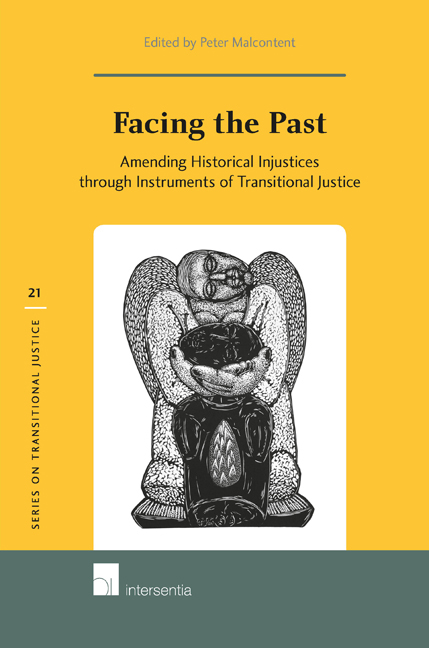Book contents
- Frontmatter
- Acknowledgements
- Contents
- PART I TRANSITIONAL JUSTICE. WHAT'S IN THE NAME?
- PART II RETRIBUTIVE JUSTICE
- Introduction
- Pacting the Law within Politics. Lessons from the International Criminal Court's First Investigations
- National and Hybrid Tribunals. Benefits and Challenges
- Beyond the Courtroom. The Objectives and Experiences of International Justice at the Grassroots
- From Gacaca to Mato Oput. Pragmatism and Principles in Employing Traditional Dispute Resolution Mechanisms
- Dealing with Organisations and Corporations
- PART III RESTORATIVE JUSTICE
- PART IV PENDING CASES
- Author Information
Dealing with Organisations and Corporations
from PART II - RETRIBUTIVE JUSTICE
Published online by Cambridge University Press: 15 December 2017
- Frontmatter
- Acknowledgements
- Contents
- PART I TRANSITIONAL JUSTICE. WHAT'S IN THE NAME?
- PART II RETRIBUTIVE JUSTICE
- Introduction
- Pacting the Law within Politics. Lessons from the International Criminal Court's First Investigations
- National and Hybrid Tribunals. Benefits and Challenges
- Beyond the Courtroom. The Objectives and Experiences of International Justice at the Grassroots
- From Gacaca to Mato Oput. Pragmatism and Principles in Employing Traditional Dispute Resolution Mechanisms
- Dealing with Organisations and Corporations
- PART III RESTORATIVE JUSTICE
- PART IV PENDING CASES
- Author Information
Summary
INTRODUCTION
While it may be common knowledge that historical injustices are perpetrated by repressive governments, accepting this would require one to overlook the role that private organisations and corporations may play in those injustices. Although it is true that governments normally are the principal perpetrators of historical injustices, it is no less true that governments are in need of practical support to carry out their plans, support that is often provided by willing organisations and corporations (e.g., financing, supply of chemicals and weapons, building of infrastructure, exploitation of natural resources, etc.). These organised private actors do not commit historical injustices entirely on their own, but tend to conspire with, or assist, governments in committing the wrongs. The question then arises as to what acts can precisely engage these actors’ legal responsibility (liability), and how can they be held accountable.
The role of private organisations and corporations in committing, or contributing to, historical wrongs has not been widely documented, since accountability for historical injustices has so far mainly, and even almost exclusively, focused on states and individual actors as principal perpetrators. The corporate social responsibility movement has admittedly drawn more attention to the role of corporations recently, but the step from mere allegations and moral repudiation to legal liability, which forms the basis for remedies in courts, has not fully been made. Often, evidence regarding the exact participation of the corporation in the governmental criminal enterprise is lacking. But more fundamentally, liability and complicity standards currently appear to be too undetermined to buttress a viable case in court. Does it suffice for the private entity to have simple knowledge of the crimes (about to be) committed by the government which they assist for that entity to be held liable, or is intent on the part of the entity required (in the sense of the entity specifically intending the criminal consequences to take place)?
This chapter aims to discuss he corporate complicity standards that civil and criminal courts have grappled with since World War II. The contribution will mainly analyse relevant court cases arising under the US Alien Tort Claims Act (ATCA) – which allows claims against corporations for violations of ‘the law of nations’ – and cases brought against Nazi industrialists before Allied war crimes tribunals in post-war Germany.
- Type
- Chapter
- Information
- Facing the PastAmending Historical Injustices Through Instruments of Transitional Justice, pp. 187 - 202Publisher: IntersentiaPrint publication year: 2016



